|
De Canadese schrijfster Antonine Maillet werd geboren op 10 mei1929 in Bouctouche, New Brunswick. Zie ook alle tags voor Antonine Maillet op dit blog.
Uit: Bearsaga (L’Oursiade, vertaald door david L. Koral)
“They say his mother fed him on bear’s milk as she went through the terminal stage of tuberculosis. No doubt about it: once every two years, when the conditions are right, the black she-bear drops a litter, and for five months she nurses her two or three cubs. One more infant at her breast wouldn’t make her run dry. But no one could say how a woman who had just given birth, consumptive to boot, managed to draw milk from a six-hundred-pound sow and be left unscathed. Not a single scratch. These were lean times for everyone, they say, while the bears, on the other hand, abounded in the woods, glutted and fat. Believe what you like. In any case, a mother whose breasts are empty and knows she’s a goner won’t be too picky, and builds up her resolve. It’s true. Under similar circumstances, the weathervane’s been known to beat back the wind. But to go rummaging through the belly fur of a mother bear as she stepped out of her winter quarters with a yawn and two woolly balls of fur rolling by her sides and tumbling between her paws. To elbow newborn cubs out of the way to make room for her own: a pink, hairless little man…no, there’s no way Simon the Halfbreed could have suckled milk from a bear, as it’s been told; he must have been fed by one of those few, kindhearted wet-nurses untouched by the Spanish flu or the times of tuberculosis. Anyway, even the most fanatical hunter would never kill his nurse, anyone could tell you that. That’s a whole different matter. For this outlaw, the law of blood was the same as any other. A law is a law. Simon was born outside.”
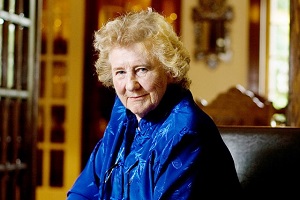
Antonine Maillet (Bouctouche, 10 mei 1929)
De Sloveense schrijver, dichter en toneelschrijver. Ivan Cankar werd geboren in Vrhnika op 10 mei 1876. Zie ook alle tags voor Ivan Cankar op dit blog.
Uit: A Cup of Coffee (Vertaald door Louis Adamie)
“One day I craved black coffee. I don't know how it came to my mind; I simply wanted some black coffee. Perhaps because I knew that there was not even a slice of bread in the house and that much less coffee. Sometimes a person is merciless, cruel.
Mother looked at me with her meek, surprised eyes but would not speak. After I informed her that I wanted some black coffee, I returned to the attic to continue my love story, to write how Milan and Breda loved each other, how noble, divine, happy and joyful they were.—"Hand in hand, both young and fully alive, bathed in morning dew-drops, swaying—"
Then I heard light steps on the stairs. It was mother, ascending carefully, carrying a cup of steaming coffee. Now I recall how beautiful she was at that moment. A single ray of sun shone directly into her eyes through a crack in the wall. A divine light of heaven, love and goodness were there in her face. Her lips held a smile as those of a child bringing one a gift. But—
"Leave me alone!" I said harshly. "Don't bother me now! I don't want any coffee!"
She had not yet reached the top of the stairs. I saw her only from her waist up. As she heard my words, she stopped and stood there motionless, only the hand holding the cup shook. She stared at me in terror and the light in her face died.
Blood rushed to my head, from shame, and I stepped toward her as quickly as I could.
"Give it to me, mother."
But it was too late. The light in her face had died. The smile on her lips had vanished.
As I drank the coffee, I said to myself:
"Tonight I shall speak tenderly to her and make up for what I have done."
In the evening I could not speak to her kindly, nor the next day.
* * *
Three or four months later a strange woman brought a cup of coffee to my room. Suddenly I felt a sting in my heart. I wanted to cry out from pain. I shivered, my whole being trembling in stark agony.—For a man's heart is a just judge; a man's heart does not concern itself with paragraphs in statute books or trifles.”
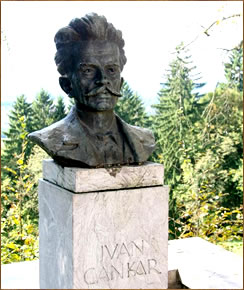
Ivan Cankar (10 mei 1876 - 11 december 1918)
Borst beeld in Ljubljana
De Duitse dichter Martin Boelitz werd geboren op 10 mei 1874 in Wesel. Vanaf 1902 leidde hij de uitgeverij Nieter in Nürnberg. Zie ook alle tags voor Martin Boelitz op dit blog.
Spielmannslied
Herr Nachbar, riegelt die Thüren fest,
Ein Dieb steht auf der Lauer,
Herr Nachbar, dass Ihr nicht vergesst,
Euer Zeisig lockt im Bauer,
Steckt schon das krause Köpfchen raus,
Herr Nachbar, hütet Euer Haus!
Ting ting, pinkperingping,
Ein Zeisig ist ein loses Ding
Zrrrr …
Im Schützenzelt ist Tanzmusik,
Hei, wie die Aeuglein blinken!
Der Spielmann geigt sein Meisterstück,
Vergisst sogar das Trinken,
Muss immer nach der Dirne schaun,
Stünd’ lieber mit ihr am Gartenzaun –
Ting ting, pinkperingping,
Ein Zeisig ist ein loses Ding
Zrrrr …
»He Jungfer!« – aber die Jungfer lacht,
Schlüpft kichernd durchs Gedränge,
Durch’s Hofthor in die Sommernacht,
Ins blühende Gehänge,
Das Köpfchen ward ihr gar zu warm,
Nun träumt’s in einem Spielmannsarm –
Ting ting, pinkperingping,
Ein Zeisig ist ein loses Ding
Zrrrr ziu!
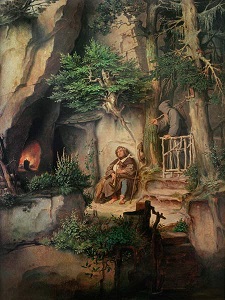
Martin Boelitz (10 mei 1874 – 5 december 1918)
Moritz von Schwind - Ein Spielmann bei einem Einsiedler, 1846
De Amerikaanse schrijfster Ariel Durant (eig, Chaya Kaufman) werd geboren op 10 mei 1898 in Proskoeriv, tegenwoordigChmelnytsky in de Oekraïne. Zie ook alle tags voor Ariel Durant op dit blog..
Uit: Napoleon (Samen met Will Durant)
“He was “scrupulously neat in his person.” He had a passion for warm baths, sometimes lingering in them for two hours; probably he found in them some relief from nervous tensions, muscular pains, and an itching skin disease that he had contracted at Toulon. He used eau-de-cologne on his neck and torso as well as on his face. He was “exceedingly temperate” in food and drink; diluted his wine with water, like the ancient Greeks; and usually gave only ten or fifteen minutes to his lunch. On campaigns he ate as chance allowed, and often hurriedly; sometimes this led to indigestion, and at the most critical moments, as at the battles of Borodino and Leipzig. He suffered from constipation; in 1797 he added hemorrhoids, which he claimed to have cured with leeches. “I never saw him ill,” said Meneval, but he added: “He was only occasionally subject to vomiting bile, which never left any aftereffects....He had feared, for some time, that he was affected with a diseases of the bladder, because the keen air of the mountains caused him a kind of dysuria; but this fear was found to be without foundation.” However, there is considerable evidence that in his later life Napoleon was afflicted with inflammation of the urinary tract, sometimes leading to painful and inconveniently frequent urination. His overstrung nerves sometimes (as at Mainz in 1806) collapsed into convulsions partly resembling epileptic seizures; but it is now generally agreed that he was not subject to epilepsy. »
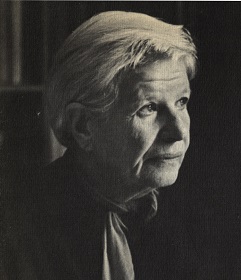
Ariel Durant (10 mei 1898 – 25 oktober 1981)
De Duitse schrijver Fritz von Unruh werd geboren op 10 mei 1885 in Koblenz. Zie ook alle tags voor Fritz von Unruh op dit blog.
Uit: Opfergang
„Sergeant Hillbrand wandte sich: „Herrgott, warum diese verzweifelte Heimatsliebe? Gleicher Mond, Nebel — und Wiesenglanz; Wälder wie daheim! Brüder, warum hat man die Heimat so lieb?" — Leiser Gesang um des Zuges Gepolter. Funkelnde Augen, Kopf an Kopf sahen Kameraden sternenweit. Es wurde still. Vize Clemens flüsterte: „Eisen rollt über Eisen. So hart, so weh!" Die anderen waren eingeschlafen.
Ruck schüttelte alle übereinander. „Sedan!" Der Kriegsfreiwillige sprang auf: „Was ist hier? Sedan? Dieser Ort ist Sedan?" — „Vorhang zu! Aufs Ohr gelegt," brummte der Trommler. „Sedan!" klang es aus tiefer, träumender Brust. „Weiß der Kuckuck, heulst Du, Heinz?" — Ungestüm drückte der Freiwillige des Gefreiten Hand: „Es ist so seltsam, so viel, zuviel für mich!" Preis streichelte ihn: „Quatsch! Wird ja erst kommen, nur Geduld, Kerlchen. Geduld ist mehr als alle Weisheit!" — Unter dem Vorhang kam ein dünner Soldat hereingebückt, „Kellner" genannt. Der Trommler richtete sich auf: „Nun, von Latrine?"
„Jawohl, und aus sicherer Quelle; vor uns soll schon ein Korps durchgekommen sein!" — Clemens pustete in erfrorene Hände: „Was ich gesagt habe, Jungens!" — Spott und Scherz gingen im Lärm des Weiterfahrens unter. Man schlief wieder ein.
Räder auf Schienen! Schienen unter Rädern! Drängender Dampf in Röhren und Kolben. Stöhnen und Jauchzen!
Dem Clemens trat Schweiß auf die Stirne. Er zog die Beine zur Brust und horchte: Wollende Flucht von Millionen Atomen! Bändigende Zucht, befehlender Geist! Eisen auf Eisen, fliegende Kraft! Der Lehrer fuhr zusammen, immer wenn es über eine Weiche ging. Er hörte Granaten und Einschlagriß und krümmte die Zehen. „Wofür lernte ich, wofür lehrte ich?"
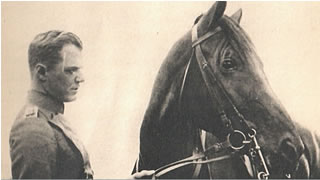
Fritz von Unruh (10 mei 1885 – 29 november 1970)
De Vlaamse schrijver en dichter Leonard Buyst (ook wel Léonard) werd geboren in Lokeren op 10 mei 1847. Zie ook alle tags voor Leonard Buyst op dit blog.
Uit: Carel Scharten: De stand onzer hedendaagsche dichtkunst (De Gids, 1909)
“Vooreerst, dat, waar het Vlaamsche verhalend proza, met Streuvels, Buysse en Vermeylen, wellicht door het Nederlandsche niet geëvenaard wordt, de poëzie echter, sinds Gezelle's dood, bij die van Holland achterstaat.
Naast een enkelen ouderwetschen poëet als Buyst, over wiens hoofd het geheele tijdperk der laatste kwart-eeuw ongemerkt schijnt heen gegaan, en een aantal Nieuwe-Gids-decadenten, van wie wij hier Nijlen en Van den Oever als de vertegenwoordigers zien, - heeft Vlaanderen eigenlijk alleen zijn Boutens in den dichter Karel van de Woestijne.
(…)
Wat zal ik ook over vader Leonard Buyst nog in den breede spreken, Buyst, den schrijver van poëzie als:
‘Laat me 't nijdig lot vergeten
op uw fraaie, albasten borst’;
- poëzie, die heusch frisch is, gehouden naast Van den Oever's zeverige klachten.
Maar zelfs over den hoog boven zijn mededichters ‘planenden’ Karel van de Woestijne heb ik weinig op het hart.”
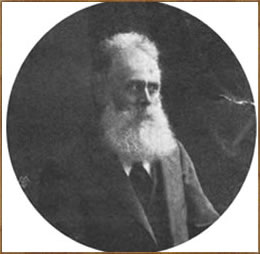
Leonard Buyst (10 mei 1847 -20 december 1918)
10-05-2015 om 13:17
geschreven door Romenu 
Tags:Antonine Maillet, Ivan Cankar, Martin Boelitz, Ariel Durant, Fritz von Unruh, Leonard Buyst, Romenu
|

